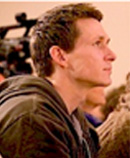
|
|
A university for learning to manage life A few years ago Motto magazine chose Cornell University’s motto as the best among America’s universities and colleges. On the university seal, the grand aspiration of the university’s founder, Ezra Cornell, read: ‘I would found an institution where any person can find instruction in any study.’ Yet anyone who has attended a university knows that while the innumerable volumes stored in libraries may at first seem to offer endless opportunity, the immensity of diving into even a small fraction of the contents in a lifetime, let alone in a few years of study, may become overwhelming and frustrating. Maharishi Mahesh Yogi, who founded a university about 100 years after Cornell was established in the 1860’s, has pointed out that the more a student learns in most universities, the more he becomes aware of the even greater amount of knowledge unknown to him. While Maharishi’s university, like all universities, offers knowledge of many disciplines, it also sees the need to incorporate another, very significant factor. The missing element in education As Maharishi explained in 1973 in a talk to the American Association for Higher Education in Houston, there is another side to knowledge in addition to knowledge of the object, or the discipline. ‘What it [the present system of education] misses,’ Maharishi told the educators, ‘[is] the knowledge of the subject, the knowledge of the knower.’ He clarified his point on the importance of the knower, the student himself, by referring to a well-known experience. ‘The knowledge is as the knower is,’ Maharishi said. ‘When the mind is dull, when the knower is sleepy, the knowledge is something different than what it is when one is wide awake, fresh in the morning—completely. The perception is different, the understanding is different, emotions are different. Knowledge is different in different states of consciousness.’ ‘Without the knowledge of the knower,’ Maharishi further explained, ‘when the knower is in ignorance about himself, the whole structure of knowledge is as if baseless. The foundation of knowledge is the consciousness of the knower, is the knower. But if the knower is in [the] dark, the knower doesn’t know himself, then it’s very obvious that the whole structure of knowledge, the whole field of knowledge has no basis to it. And such baseless knowledge can only be non-fulfilling.’ Maharishi expressed his appreciation that education as prevalent in the world has its great values. It offers blessings of knowledge for progress in the objective, material field of life, bringing satisfaction on that level. But, no matter how much instruction in every field of study may be offered, without including values on the subjective level of life, the individual remains unfulfilled. Expressing to his Houston audience this need for subjective knowledge to be part of education, Maharishi said, ‘It’s now high time that we provide the knowledge of the knower along with the knowledge of all disciplines.’ Consciousness-Based Education To fill that need of providing the student with knowledge of his own inner self, in 1971 Maharishi introduced a system of Consciousness-Based Education which develops the consciousness of every student and thereby unfolds his full, infinite potential. Initially, Maharishi formulated the Science of Creative Intelligence (SCI) to provide complete knowledge of consciousness on not only the intellectual level but, very significantly, through direct experience with the practice of his Transcendental Meditation technique. As a supplementary course to other disciplines, SCI reveals the common basis of all disciplines—whether it be math, art, biology, literature, etc.—as consciousness. The experiential and intellectual knowledge of the knower, as provided by SCI, develops the inner genius of every student and lays a profound basis for every discipline so that the student may easily connect whatever subject he is studying to his own self, making it meaningful, relevant and fulfilling. Learning to manage life at Maharishi University of Management In the same year that Maharishi spoke to the Houston educators, he began Maharishi International University. Significantly, the name changed in 1995 to Maharishi University of Management (MUM) emphasizing that the knowledge and experience of one’s inner self is of an immense and powerful practical value, allowing the student to fully manage his or her own life peacefully, harmoniously, happily, efficiently. The word management, for MUM students, means knowing how to do less and accomplish more. Indeed, Maharishi asked rhetorically, how much can one achieve through hard work? He offered an option advising that instead of working hard, you should get the ‘master key for success’ by experiencing and stabilizing yourself in your Self, the state of intelligence deep within. This is easily done through the regular practice of the Transcendental Meditation technique alternated with the activities of daily life. Becoming established in your own inner Self, the unified field at the basis of all creation, Maharishi explained, you spontaneously engage the infinite intelligence of Natural Law to work and accomplish for you. The motto of Maharishi University of Management is ‘Knowledge is structured in consciousness’. Its unique angle provides the key for unlocking the door to the missing element in education and gives the student the master key for managing life successfully. To enjoy success, Maharishi advised that you need to develop your consciousness, to know your inner Self, the source of success. He gave supreme importance to your own self-referral field of consciousness and to unfolding it completely through twice daily practice of the Transcendental Meditation technique. If you use your time that way, your self will be functioning on the level of the cosmic Self and you will manage big things.
© Copyright 2012 Global Good News®
|
|

